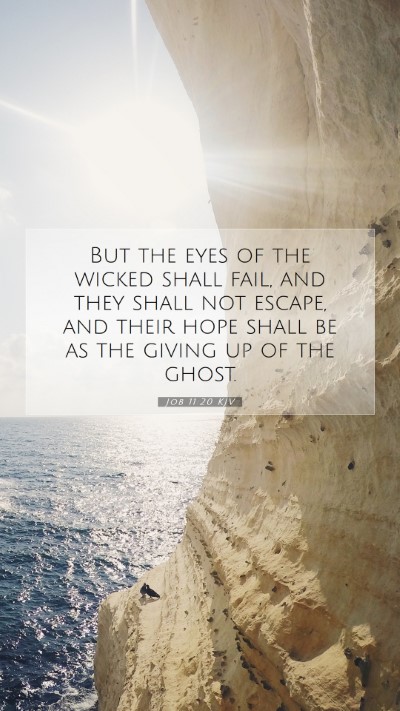Old Testament
Genesis Exodus Leviticus Numbers Deuteronomy Joshua Judges Ruth 1 Samuel 2 Samuel 1 Kings 2 Kings 1 Chronicles 2 Chronicles Ezra Nehemiah Esther Job Psalms Proverbs Ecclesiastes Song of Solomon Isaiah Jeremiah Lamentations Ezekiel Daniel Hosea Joel Amos Obadiah Jonah Micah Nahum Habakkuk Zephaniah Haggai Zechariah MalachiJob 11:20 Meaning
What is the meaning of Job 11:20?
But the eyes of the wicked shall fail, and they shall not escape, and their hope shall be as the giving up of the ghost.
Job 11:20 Bible Verse Meaning
Understanding Job 11:20 - Bible Verse Meaning and Commentary
Job 11:20 states, "But the eyes of the wicked will fail, and escape will elude them; their hope will become a dying gasp." This verse speaks to the ultimate fate of the wicked, contrasting their despair with the hope of the righteous. Let’s delve deeper into its meanings through various public domain commentaries.
Overview of Job 11:20
This verse is part of a dialogue between Job and his friend Zophar, who harshly critiques Job's character and faith. The verse captures a profound theological point regarding the fate of those who live in wickedness. The commentary interpretations from Matthew Henry, Albert Barnes, and Adam Clarke provide rich insights into its implications.
Commentary Insights
- Matthew Henry's Commentary:
Henry emphasizes that Zophar speaks about the inevitable downfall of the wicked. He interprets "the eyes of the wicked will fail" as a depiction of despair. The hope of the wicked is likened to a dying gasp, signaling that their anticipated escape from God’s judgment will vanish. This highlights the futility of living in opposition to God’s will and the dangers of false security.
- Albert Barnes' Commentary:
Barnes elaborates on the term "fail," which signifies not just the loss of hope, but a complete breakdown of what the wicked rely on. He links this to the broader theme of divine justice, indicating that the seeming prosperity of the wicked will ultimately come to an end. The verse serves as a warning about the fleeting nature of wickedness and encourages the faithful to remain steadfast in hope and righteousness.
- Adam Clarke's Commentary:
Clarke points out the metaphor of "escape" being elusive for the unrighteous. He suggests that the passage underscores a universal truth: the ultimate fate of the wicked is death and despair, in contrast to the eternal joy promised to the believers. Clarke's analysis conveys a sense of urgency for the wicked to turn from their ways, emphasizing repentance and turning towards divine mercy.
Key Themes and Interpretations
This verse touches on several key themes:
- Despair of the Wicked: The graphic imagery of failing eyes captures the hopelessness that comes with rejecting God.
- Temporary Nature of Evil Prosperity: It stresses that any success the wicked may appear to have is temporary and will lead to inevitable judgment.
- Divine Justice: The verse resonates with the larger biblical theme of justice, reminding readers that God's judgment is both certain and fair.
Applications of Job 11:20
For those studying this verse in the context of Bible verse meanings and interpretations, it provides numerous applications for daily life:
- Encouragement for Believers: It serves as a source of strength for the righteous, affirming that their faithfulness will ultimately be rewarded.
- Warning to the Wicked: The verse acts as a stark warning for those living in sin, encouraging self-reflection and repentance.
- Promotion of Hope: For individuals facing adversity, it reinforces the message that hope is anchored in God’s faithfulness rather than worldly circumstances.
Related Cross References
- Psalms 112:10: "The wicked will see it and be angry; they will gnash their teeth and waste away; the longings of the wicked will come to nothing."
- Proverbs 10:28: "The prospect of the righteous is joy, but the hopes of the wicked come to nothing."
- Isaiah 48:22: "There is no peace, says the Lord, for the wicked."
Conclusion
The insights gleaned from public domain commentaries highlight the profound meaning encapsulated in Job 11:20. By integrating comments from respected biblical scholars, this exploration of the verse provides a solid framework for understanding its significance in both historical and modern contexts. As Bible study groups seek greater insights, contemplating the meanings and interpretations of such verses can foster deeper theological discussions and personal spiritual growth.


